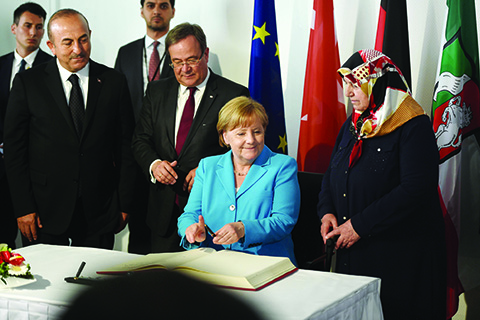
DUSSELDORF: German Chancellor Angela Merkel (center) reacts as she signs the guestbook beside Mevlude Genc (right), mother, grandmother and aunt of the victims, North Rhine-Westphalia's State Premier Armin Laschet (center left) and Turkish Foreign Minister Mevlut Cavusoglu (left) during a ceremony marking the 25th anniversary of an arson attack that killed five people of Turkish origin yesterday. - AFP
SOLINGEN, Germany: Germany yesterday remembered the five ethnic Turkish victims of a murderous neo-Nazi arson attack 25 years ago, amid warnings of resurgent German xenophobia and simmering bilateral tensions ahead of Turkish elections. In the 1993 attack, one of post-war Germany’s most notorious racist hate crimes, four far-right skinheads set fire to a Turkish family’s home in the city of Solingen. They killed five women and girls, the youngest just four years old, and injured 14 others.
German Chancellor Angela Merkel and Turkish Foreign Minister Mevlut Cavusoglu attended memorial ceremonies along with Mevlude Genc, 75, who lost two daughters, two granddaughters and a niece, yet strongly urged reconciliation after the attack. Foreign Minister Heiko Maas made a plea for “tolerance, diversity and humanity within our country and in the world”, speaking to German newspapers. He said it was “shameful” that even today many Turkish immigrants and their descendants “experience discrimination in everyday life”.
“I want to tell you: You are not only welcome here, you are part of our country,” Maas said, addressing Germany’s three-million strong ethnic Turkish community, the largest group of Turks abroad. The anniversary comes as Germany struggles with a new upsurge of racist attacks and far-right activism, including last year’s entry into parliament of the anti-Islam party Alternative for Germany (AfD), following an influx of more than one million asylum seekers since 2015.
‘Racism, Islamophobia’
AfD co-leader Alice Weidel this month described immigrants as “headscarf girls, welfare-claiming, knife-wielding men and other good-for-nothings” - incendiary comments that earned her a formal rebuke from the parliamentary speaker. Turkey’s foreign ministry Monday voiced concern that “racism, xenophobia and Islamophobia are on the rise” again in the biggest EU country and called on politicians and media there to “use prudent language”.
The head of the Turkish Community in Germany, Gokay Sofuoglu, also warned that “rightwing populist arguments are once more setting the tone in the refugee and migration debate”. Referring to the bereaved mother Mevlude Genc, holder of Germany’s highest civilian honor for her calls for tolerance and healing, he said she “was never really listened to”. The deadly Solingen blaze was set by four males aged 16 to 23 from the German far-right skinhead subculture that flared in the early 1990s amid an influx of eastern European asylum seekers.
The four juvenile and adult offenders received maximum jail terms of 10 to 15 years, which all ended years go. The space where the charred remains of the Genc family house once stood is now a vacant lot where five chestnut trees have been planted to honor the victims.
‘Terrible attack’
While both Germany and Turkey have stressed their shared sorrow over the tragic deaths, high tensions linger after a deep crisis between the governments of Merkel and President Recep Tayyip Erdogan. Germany has repeatedly voiced concerns about deteriorating civil rights and media freedoms in Turkey, especially after a crackdown and mass arrests following a failed 2016 coup against Erodgan. Ankara has been angry over Berlin’s decision to bar Turkish politicians from campaigning in Germany, where some 1.4 million ethnic Turks are eligible to vote in their ancestral homeland - a move Erdogan has slammed as a “Nazi-style” ban.
Erdogan and his Justice and Development Party (AKP) are seeking another mandate in snap parliamentary and presidential polls on June 24. Conservative German politicians have cautioned that Cavusoglu must not misuse the memorial events to campaign for Erdogan’s AKP party or deepen divisions in the Turkish-German community. Maas has stressed the campaign ban applies to all non-EU politicians facing elections within three months, and said he was sure Cavusoglu’s speech would “not constitute election campaigning but commemorate the victims of this terrible attack”.
Other EU countries, including Austria and the Netherlands, have also sparred with Turkey in recent years. In France, the popular news magazine Le Point said this week it had suffered harassment and intimidation by Erdogan supporters after it labelled him “The Dictator” on its front cover. French President Emmanuel Macron rallied behind the magazine, calling the abuse “totally unacceptable” and warning in a tweet that “you cannot put a price on freedom of the press, without it, it’s dictatorship”. - AFP










